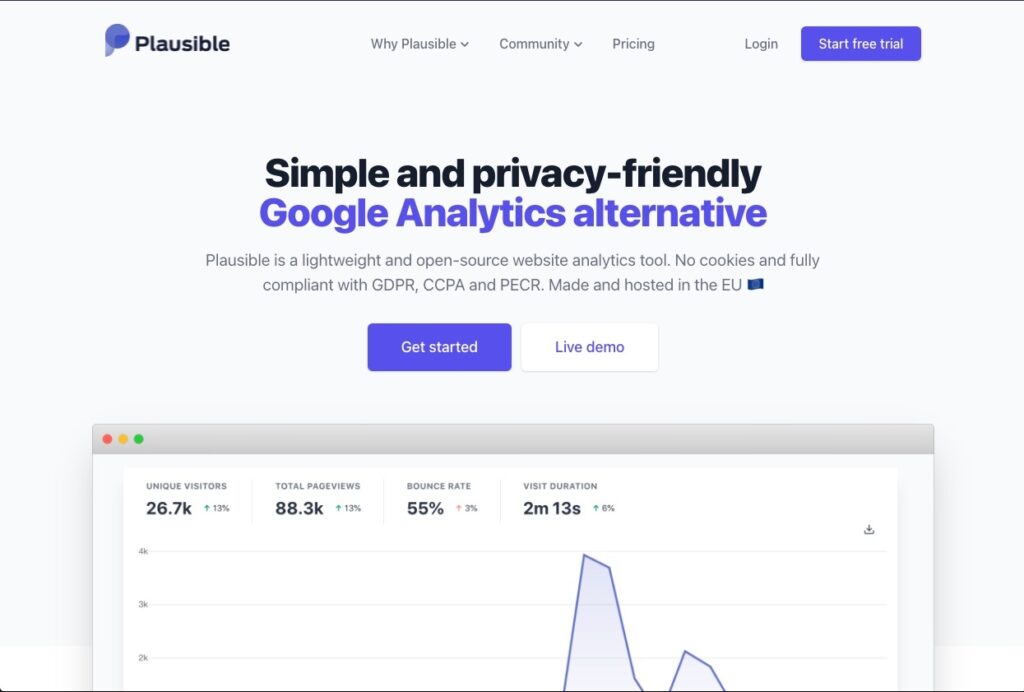I’ve been thinking about Google Analytics. I know – it’s the fun stuff.
For years I would install Google Analytics on client websites without a second thought. It offers a huge range of analytical tools for clients who – with an amount of time on their hands – could set up a ton of different goals, dashboards, reports, and so on to measure every minute detail of their website performance.
And that’s great – they can still do that. I guess, the question became: but does anyone actually do that? And if not, should we be looking at an alternative to Google Analytics?
Google Analytics is hugely overwhelming
It just is. I think I installed it as a matter of course out of a desire to provide something so impressive looking without actually having to do much work – certainly without considering if it was the most appropriate solution for the client’s needs. I could copy & paste a chunk of code and within 24 hours, huge amounts of data were being tracked.
But right … back to the actual needs of the client. And I think, in general, this is something where the developer/designer community often fails clients. We’re sometimes guilty of doing the impressive yet easy thing while ignoring the actual needs of the client.
What clients tend to need from their website is a basic summary of their traffic. They need to know what pages are most popular, where traffic comes from, if their traffic is improving or declining, and use that information to form a plan for upcoming content generation.
And often, that’s pretty much it. Yes, there are clients who want a lot more than that – but I’d say that for over 60% of my clients, a basic understanding of how much, where from, and where to is enough.

Oh, and now with the ethical concerns…
There is also an ethical question that I’m asking myself more often these days: am I comfortable with the amount of data Google Analytics sucks in? Often, I’m not. It can seem like a massive intrusion now to scrape every little available piece of information from a user – and then to store that information both in the clients’ Google Analytics account, but also (a lot of it) in the users’ browser in the form of cookies.
Do we need to be that intrusive?
And of course, there’s the age-old saw that if the product is free, it’s because you’re the product. And it rings true here … I can promise you that Google is not sitting on all that data, doing nothing with it, like a dragon with its gold. It is being used to benefit Google and its advertising partners. Remember – google is not a search engine, it is an advertising platform.
Compelling alternatives to Google Analytics
So … what to do? Increasingly I’ve been recommending one of two solutions for most of my clients.
The one I use myself is called Plausible. It’s super simple analytics that are easy to understand. It is extremely lightweight – meaning my site is not weighed down with an unnecessary burden. It is also importantly, ‘privacy friendly’ … all measurement is anonymous, cookies are not used, and no personal data is collected. There is no cross-site or cross-device tracking either – so the information collected stays at the same point where it was collected. I love it – it’s simple and transparent, and I get a weekly report which would be useful if I didn’t already check it daily.

An alternative is Fathom – created by the one-man web marvel Paul Jarvis. I’ve not used it myself, but they have a demo online and it looks impressive and useful, and also privacy-focused. A few more reporting capabilities than Plausible mean it is a more advanced fit for slightly larger clients.
For anyone who needs a full-featured alternative to Google Analytics, they could do worse than checking out Matomo … but it’s still massive, you’ll only use a fraction of it, and if I were you: I’d concentrate on the basics of what you actually need to know for your business.
Hope that helps – chat to you later.

